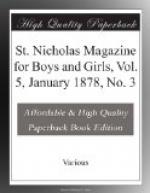The poet and his sister talked of their life on
the old farm, which Whittier has described in “Snow
Bound,” and he showed me a quaint old book
written by Thomas Elwood, a friend of Milton.
It was the only book of poetry that Whittier had
been able to get to read when a boy.
Like all distinguished writers, Whittier has a large number of letters from persons whom he does not know, and many strangers go to see him. Miss Whittier said that one evening the bell rang, and Whittier went to the door. A young man in officer’s uniform stood there. “Is this Mr. Whittier?” he asked. “Yes,” was the answer. “I only wanted to shake hands with you, sir,” and grasping the poet’s hand he shook it warmly, and hastened away.
Some years after my first visit a great sorrow befell Whittier in the loss of his sister. After that, a niece kept house for him. She is now married, and he spends most of his time with some cousins at “Oak Knoll,” a delightful place near Danvers. It was there that I last had the pleasure of seeing him, one golden day in October. The house is situated on an eminence, surrounded by fine trees, which were then clad in their richest robes of crimson and bronze and gold. Through the glowing leaves we caught glimpses of the deep blue sky and the distant hills. We had a pleasant walk through the orchard, in which lay heaps of rosy apples, and across fields and meadows, where we gathered grasses and wild flowers. And we saw the pigs and cows and horses, and had the company of three splendid dogs, great favorites of the host. We had also for a companion a dear, bright little girl, a cousin of the poet. She is the “little lass,” the “Red Riding Hood” of his poem.
After a most enjoyable day
I came away reluctantly, but happy at
leaving my friend in such
a pleasant home, and among the charming
and refreshing country scenes
that he loves so well.—Yours truly,
C.L.F.
* * * * *
AGNES’S MOTHER, whose letter was printed in the “Letter-Box” for January last, will oblige the Editors by sending them Agnes’s address.
* * * * *
Uxbridge, Mass.
DEAR ST. NICHOLAS: Last summer, we stayed a week on Prudence Island, in Narragansett Bay, where the blackberries sprinkle thickly the ground, and mosquitoes, in some parts of the island, sprinkle thickly the air. Prudence, Patience, Hope, and Despair are four islands near together; they were named by the owner after his daughters. Prudence has some twelve or fifteen houses; but in Revolutionary times there were, it is said, seventy families on the island. The British set fire to everything, and the island was devastated. One old hornbeam-tree is pointed out as the only tree that escaped destruction. The wood of this kind of tree is so hard that it does not burn easily. This tree is sometimes called “iron




